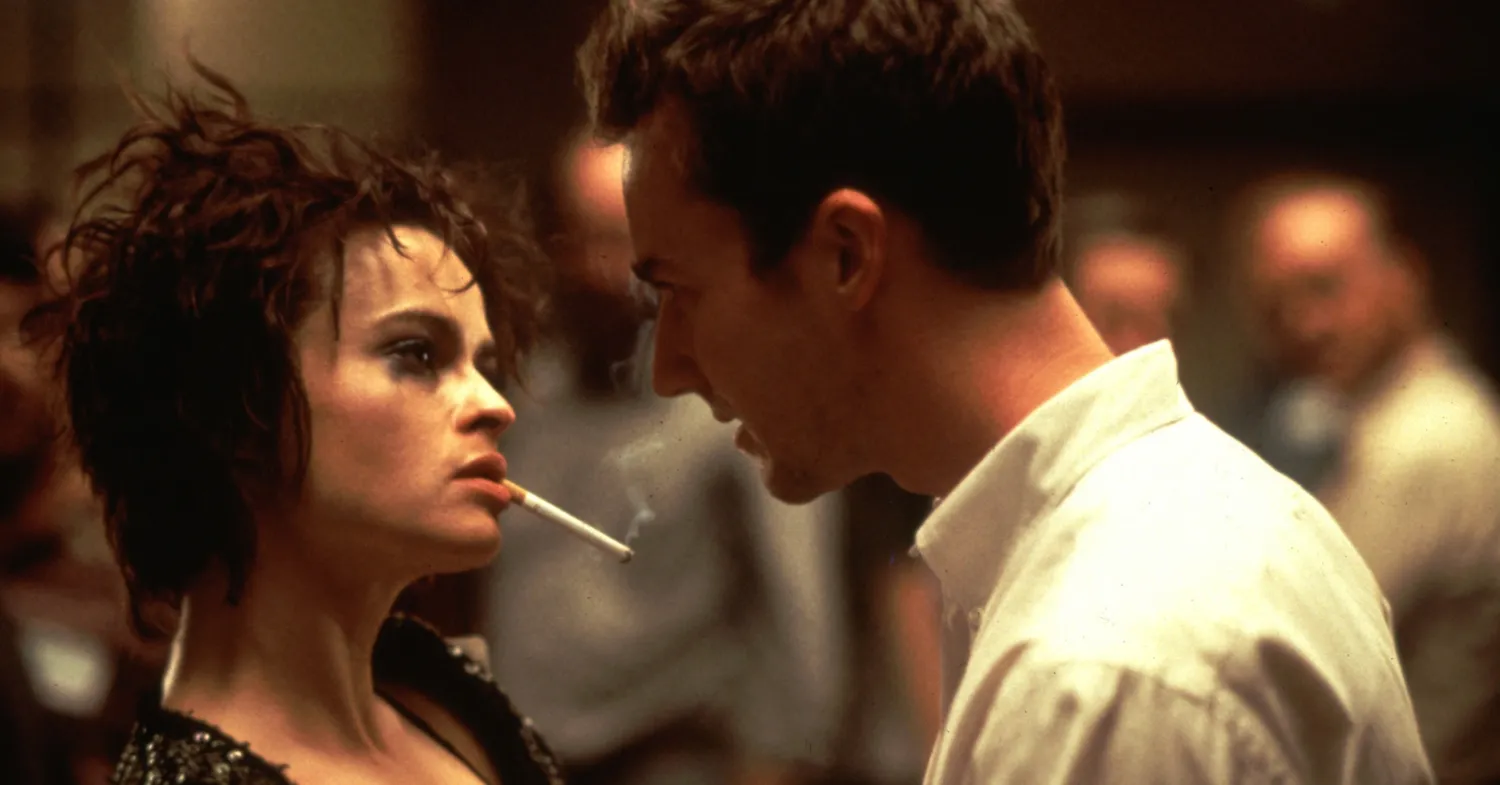Released over two decades ago, David Fincher‘s Fight Club remains in popular culture the way few films ever do. A movie that often resonates with those feeling marginalized by society, Fight Club lives on for each generation to interpret in new ways.

In the realm of modern cinema, where conformity often reigns supreme, there exists a dark, subversive gem that has left an indelible mark on the collective psyche of film enthusiasts. Enter Fight Club, David Fincher’s anarchic odyssey into the depths of identity, masculinity, and consumerism. Two decades since its release, the film endures as a provocative, if not controversial, exploration of the human condition.
Fight Club embraces chaos from the very outset. With a narrative structure as fractured as its characters’ minds, it delivers a punch to the gut of traditional storytelling. Edward Norton’s nameless protagonist narrates his life’s descent into soul-crushing monotony with a bleak cynicism. In a bid to regain a sense of self, he stumbles upon Tyler Durden, brought to life with devilish charisma by Brad Pitt. This unholy union sparks the birth of an underground fight club, a secret society where men are free to strip themselves of societal expectations and embrace raw, primal instincts.
Yet, beneath the brutal fisticuffs lies a cerebral battleground where Fight Club grapples with themes that are more pertinent today than ever. It raises questions about consumerism and the commodification of human existence, challenging us to confront the shallow materialism that often defines our lives. As our unnamed protagonist and Tyler spiral deeper into their underground world, the film forces viewers to question their own reality, mirroring the identity crisis that plagues the characters.
Edward Norton and Brad Pitt, two industry juggernauts at the peak of their power, stand at the epicenter of Fight Club‘s visceral brilliance. Norton, as the tormented narrator, portrays his character’s descent into madness with a nuanced performance that captures both vulnerability and an unsettling allure. In contrast, Brad Pitt’s Tyler Durden oozes a charismatic charm that’s simultaneously magnetic and menacing. The dynamic between these two actors is electrifying, providing a constant undercurrent of tension.
David Fincher’s directorial signature is etched into every frame of Fight Club. He thrusts us into an unapologetically dark and gritty world, immersing us in a sensory overload of pulsating visuals and relentless, no-holds-barred camera work. Fincher’s intimate close-ups dissect the characters’ inner turmoil, making us voyeurs to their darkest secrets. The director’s fearless approach to depicting violence, debauchery, and anarchy adds to the film’s unnerving ambiance.
The film’s cinematography, masterfully executed by Jeff Cronenweth, captures the essence of chaos and despair. It employs a dark and gritty palette, highlighting the grimy underbelly of the characters’ lives. The use of handheld cameras immerses us in the frenetic energy of the fight club, emphasizing the raw physicality of the brawls. Fincher’s collaboration with editor James Haygood is equally praiseworthy, as they construct a narrative that blurs the line between reality and delusion. The editing rhythm mirrors the protagonist’s fractured state of mind, creating a disorienting and intense experience for the audience.
While Norton and Pitt command the spotlight, Fight Club boasts a supporting cast that adds layers of complexity to the narrative. Helena Bonham Carter as Marla Singer injects a sense of nihilistic apathy, mirroring the protagonists’ disillusionment. Meat Loaf‘s role as Bob, a member of the fight club, offers a poignant glimpse into the lives of the club’s members. The characters are a testament to Chuck Palahniuk’s novel, from which the Fight Club is adapted, and their portrayals contribute to the film’s rich tapestry of despair and rebellion.
Two decades after its initial release, Fight Club stands at a crossroads. While some consider it a timeless classic, others argue that it’s become a relic of the late 1990s, a time capsule of a specific cultural moment. Indeed, the film’s portrayal of anti-corporate sentiments, culminating in explosive anarchy, seems to speak to a particular era. Yet, its exploration of existential crisis and the quest for identity continues to resonate in a society grappling with similar questions. There’s enough on the bone that still feels prescient, even if much of Fight Club looks and feels like an era that’s passed.
Fight Club is not just a film for many; it’s an ideology, a subversive manifesto that refuses to fade into cinematic obscurity. Its legacy has transcended the silver screen, leaving an indelible mark on pop culture, inspiring real-life fight clubs, and continuing to fuel passionate debates on its merits and messages. Even in an age of digital identities and disconnection, the film’s exploration of what it means to be human remains hauntingly relevant.
Fight Club is certainly a cinematic enigma. It’s a visceral ride that dissects the human psyche while challenging our perceptions of conformity, consumerism, and chaos. It may not be David Fincher’s best movie, but its influence on modern filmmaking and its unwavering ability to provoke and perplex stand as testaments to its enduring power. So, to echo Tyler Durden’s words, perhaps it’s time to reevaluate our perceptions and embark on a journey back to the bleak-yet-thrilling world of Fight Club.
Score: 7/10
Fight Club (1999)
- Cast: Edward Norton, Brad Pitt, Helena Bonham Carter, Meat Loaf, Jared Leto, Zach Grenier, Holt McCallany, Eion Bailey
- Director: David Fincher
- Genre: Drama
- Runtime: 139 minutes
- Rated: R
- Release Date: October 15, 1999
Read More Reviews for David Fincher Movies
Cinephile Corner has reviewed the following David Fincher movies: